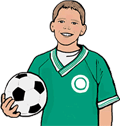Calling Players

You will need to contact each player on your team at the beginning of the season to introduce yourself. You may also need to call your team in the event of a practice or game cancellation due to weather or other circumstances.
When calling your team’s players or parents, introduce yourself by name and state that you are a coach from the Recreation Department: “Hi, this is Michael Hall with Walker Recreation. May I speak to John?” This helps to communicate to adults and wary children in the household the reason why an adult is calling for a child - especially if you are a male coach.
Coaches in the Age 4, Ages 5-6, and Ages 7-8 age groups should call the parent of the player straight away. Kids this age are less likely to remember all the many details you’ve given them and won’t be prepared to write them down. With players in the older age groups (9-10 and 11-13), they have the ability to record important information and relay that to their parents. In fact, some parents insist, as a matter of teaching their kids responsibility, that the player handle that; so in some cases, expect the parent to hand the phone to their child to have them work with you directly.
Here are some pointers to keep in mind when making your calls.
- Keep track of your contacts. Do not rely on emails, texts, or messages to reach their destination. Re-contact anyone that doesn’t confirm contact or that isn’t reached directly.
- When to call: Kids come home from school between 3:30pm and 4:30pm, so that’s a good time to reach players in the older age groups. In all cases, you will want to make your calls before 5:45pm in order to avoid conflicts with dinner time, when families are often out of the house or sitting down to a family meal. My recommendation therefore is to start making your calls at 4:30pm and you should be done by 5:30pm on a weekday with a reasonably high success rate for contacts.
- Voice Mail and answering machines: Be prepared to leave phone messages. Keep track of the kids that you could not reach in person or that have not confirmed your messages. Never assume your messages have been received.
- Keep it short: Only include your name, state that you’re a coach for the recreation department with scheduling information for the player – and finally, clearly speak your phone number!
- Parents: If an adult answers, ask if they are the player’s parent. It is ideal to have a parent answer, because then you can just give the information to them directly. Otherwise, you’ll have to leave the information with children in the household, which is generally unreliable.
- The player (or another child in the household): A younger child can become confused about message taking, so just have them take your name and phone number so the parent or player can call you back later.
- Callbacks: When you’ve left a message, you will very often got a confirming call back from a parent. Some parents prefer to use the callback as an opportunity to teach their youngsters responsibility, so they’ll put the player up to it, so don’t be surprised if your players call on their own!
- Email, text/SMS and electronic communications: In recent years, I have discovered that many people are more easily reached electronically, but be sure the person on the other end gives some kind of confirmation or reply. As with voice mail and answering machine messages, the important thing is to make sure your messages are confirmed. Keep track of the kids that you could not reach in person or that have not confirmed your messages. Never assume your messages have been received.